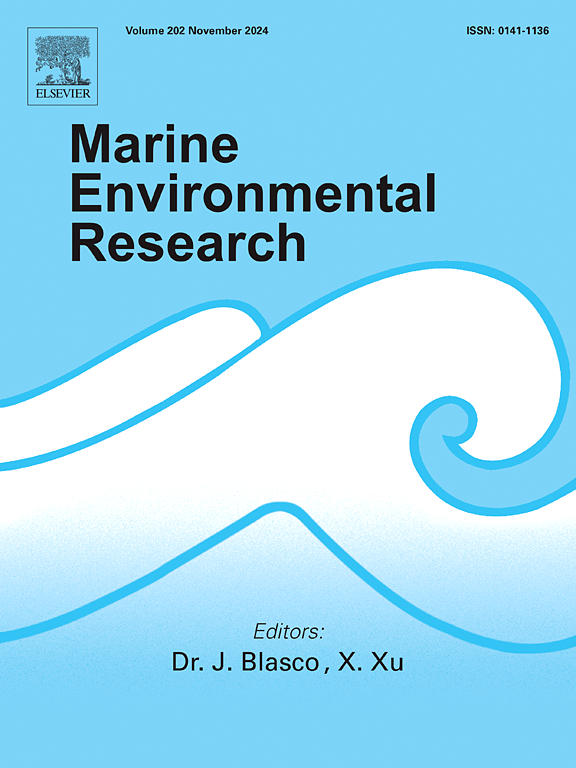Quantifying dimethylsulfoniopropionate lyase activity in marine environments using selected ion flow tube mass spectrometry
IF 3
3区 环境科学与生态学
Q2 ENVIRONMENTAL SCIENCES
引用次数: 0
Abstract
The global sulfur cycle is largely influenced by the production of dimethyl sulfide (DMS), which is primarily generated through the enzymatic cleavage of algal dimethylsulfoniopropionate (DMSP). This study presents an efficient and simplified method for analyzing DMSP lyase activity (DLA) by measuring the conversion efficiency of DMSP to DMS using selected ion flow tube mass spectrometry (SIFT-MS) coupled with a dissolved gas extraction device. Unlike conventional methods, which involve multiple steps such as trapping, desorption, and chromatographic separation, the proposed method consists of two streamlined steps: (1) Introduction of excess DMSP substrate into the sample vial, followed by continuous measurement of DMS evolution via SIFT-MS; (2) recording the DMS response at 3-s intervals and calculating the DMS production rate by dividing the integrated DMS mass over time intervals. The high-frequency detection of trace-level DMS enhances the accuracy of release rate measurements and aids in optimizing the DMSP substrate concentration. The performance of the proposed method was evaluated using cultured phytoplankton and natural seawater samples, achieving an analytical precision less than 10 % and a total analysis time of under 10 min, substantially faster than traditional gas chromatography-based techniques. This method provides a robust tool for investigating the dynamics of DMS-related processes in marine environments.

利用选择离子流管质谱法量化海洋环境中的二甲基硫代丙酸酶活性
全球硫循环在很大程度上受到二甲硫醚(DMS)生产的影响,二甲硫醚主要是通过酶裂解海藻二甲基磺酰丙酸(DMSP)产生的。本研究采用选择性离子流管质谱法(SIFT-MS)结合溶解气体萃取装置测定DMSP到DMS的转化效率,提出了一种分析DMSP裂解酶活性(DLA)的高效简化方法。与传统方法不同,该方法涉及捕获、解吸和色谱分离等多个步骤,该方法由两个简化步骤组成:(1)将多余的DMSP底物引入样品瓶中,然后通过SIFT-MS连续测量DMS的演变;(2)记录3-s间隔的DMS响应,通过DMS质量除以时间间隔计算DMS生产速率。痕量DMS的高频检测提高了释放率测量的准确性,有助于优化DMSP底物浓度。利用培养的浮游植物和天然海水样品对该方法的性能进行了评估,分析精度低于10%,总分析时间小于10 min,比传统的气相色谱技术快得多。该方法为研究海洋环境中dms相关过程的动力学提供了一个强大的工具。
本文章由计算机程序翻译,如有差异,请以英文原文为准。
求助全文
约1分钟内获得全文
求助全文
来源期刊

Marine environmental research
环境科学-毒理学
CiteScore
5.90
自引率
3.00%
发文量
217
审稿时长
46 days
期刊介绍:
Marine Environmental Research publishes original research papers on chemical, physical, and biological interactions in the oceans and coastal waters. The journal serves as a forum for new information on biology, chemistry, and toxicology and syntheses that advance understanding of marine environmental processes.
Submission of multidisciplinary studies is encouraged. Studies that utilize experimental approaches to clarify the roles of anthropogenic and natural causes of changes in marine ecosystems are especially welcome, as are those studies that represent new developments of a theoretical or conceptual aspect of marine science. All papers published in this journal are reviewed by qualified peers prior to acceptance and publication. Examples of topics considered to be appropriate for the journal include, but are not limited to, the following:
– The extent, persistence, and consequences of change and the recovery from such change in natural marine systems
– The biochemical, physiological, and ecological consequences of contaminants to marine organisms and ecosystems
– The biogeochemistry of naturally occurring and anthropogenic substances
– Models that describe and predict the above processes
– Monitoring studies, to the extent that their results provide new information on functional processes
– Methodological papers describing improved quantitative techniques for the marine sciences.
 求助内容:
求助内容: 应助结果提醒方式:
应助结果提醒方式:


